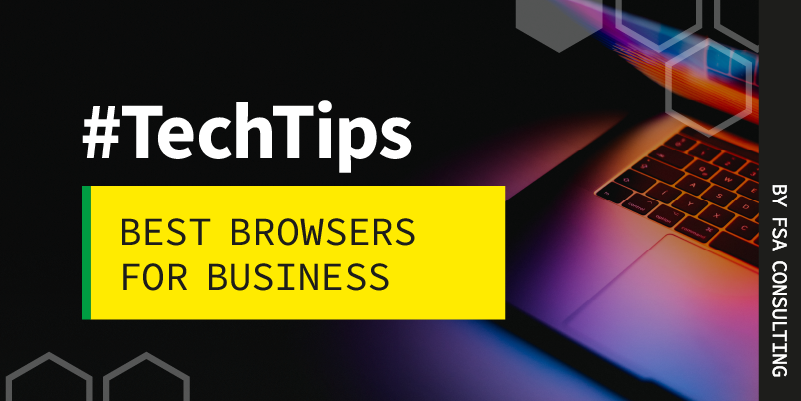Choosing the right browser for your business is crucial. It impacts security, speed, and overall productivity and depends on your existing IT infrastructure and business needs. In this post, we explore the main things to look for and the pros and cons of popular browsers.
Key Features to Consider
Integration Across Devices
Browser synchronization across devices ensures you can pick up where you left off, for example, switching from a work computer to a home laptop. This includes restoring your open tabs and synchronizing passwords, bookmarks, and settings. This is especially useful if you use cloud or browser-based programs and apps.
Default Device Browsers
Many devices have built-in default browsers, which may influence your choice based on compatibility and performance. For instance, if you are a strictly Apple company, Safari may work best, or if you are a Windows-based shop, you may want to opt for Microsoft Edge.
Cloud and Workspace Solutions
Consider how well the browser integrates with your existing software infrastructure. For example, Google Chrome may work best if your company uses Google Workspace or Chrome Enterprise.
Browser Performance
Of course, speed is crucial for productivity. You and your staff need to be able to access online programs required for daily tasks quickly and avoid interruptions and downtime issues.
Privacy and Security
Security is always at the top of the list when discussing the various aspects of your IT infrastructure. Since your browser allows you and your staff to connect to resources outside of your organization, it’s important to consider both security and privacy.
Privacy refers to the management of personal information, for instance, ensuring that users and their browsing history aren’t being tracked. Security is the protection of your data and IT ecosystem from unauthorized access. Both are essential for your company’s safety.
Browser Comparison
Google Chrome
Google Chrome is one of the most used browsers due to its simplified interface and intuitive navigation. It allows you to move between devices and still have access to your passwords, bookmarks, and settings. You can even open a window on your home computer and open the tabs you used on your work computer (or other devices). Chrome is compatible with all operating systems, so it can be used on any device.
While the browser can be used separately from your existing software solution, it is ideal for Google Workspace users. It makes using Gmail, Google Meet, Google Drive, and the rest of the suite fairly seamless.
If you use Chrome Enterprise or Google Workspace, you can set up company-wide policies to prevent data loss, limit password reuse, and protect against malware and phishing.
Unfortunately, while Chrome is known for its speed, it can drain your computer’s processing, potentially slowing productivity.
Safari
Safari is the incorporated browser in Mac OS and iOS. Like Chrome, it allows you to synchronize passwords, bookmarks, and settings across devices, so you don’t need to worry about being locked out of a browser app or website you need, regardless of where you log in.
Safari remains very secure. It utilizes iCloud Keychain for password management and has built-in tracking prevention features.
This is best for users within a complete Apple/Mac infrastructure, as it cannot be used on Windows or non-Apple products. Safari is optimized for performance and battery life on Macs. This also adds a layer of security since, as we have discussed, viruses are rarely written for Macs. This is helpful but certainly not a guarantee.
Microsoft Edge
Many companies run on Microsoft products like Microsoft 365 or Microsoft Azure. Unfortunately, people have bad memories of Microsoft’s slow and clunky former browser, Internet Explorer. Microsoft built Edge, an entirely new browser, on Chromium, the same code that powers Chrome. Edge brings a much simpler layout, ease of use, and similar speeds.
As a Microsoft tool, it integrates well with existing software like Outlook, Word, and Teams. It is optimized for Windows devices but can also run on Macs.
Edge offers customizable safety and privacy settings, including password monitoring and tracking protection.
DuckDuckGo
If your work requires high levels of privacy, DuckDuckGo may be the right browser for your office. DuckDuckGo was developed to protect online privacy. It offers superior privacy by blocking external trackers and anonymizing search activity.
You don’t need to worry about targeted ads or sites tracking you as you browse. The browser doesn’t store personal information, providing privacy without an incognito window.
As a bonus, it is headquartered in Paoli, PA, and we love supporting local and independent companies.
Tor
If you are looking for unparalleled anonymity, Tor is your best bet. Tor provides this anonymity by relaying and encrypting your traffic three times through proxy servers. This ensures user identity concealment with solid encryption, but those relays do slow down performance.
Because Tor allows for this level of anonymity, it allows users virtually unfettered access to the web. That means the good with the bad. It can open your workplace to malware and allow users to access sites that many organizations and ISP providers may have blocked. Because of this vulnerability, many sites do not allow you to access them via Tor.
Each browser has benefits depending on your work, staff, and infrastructure. Download and test drive some in your office, or contact FSA for recommendations and help with configuration and installation.

